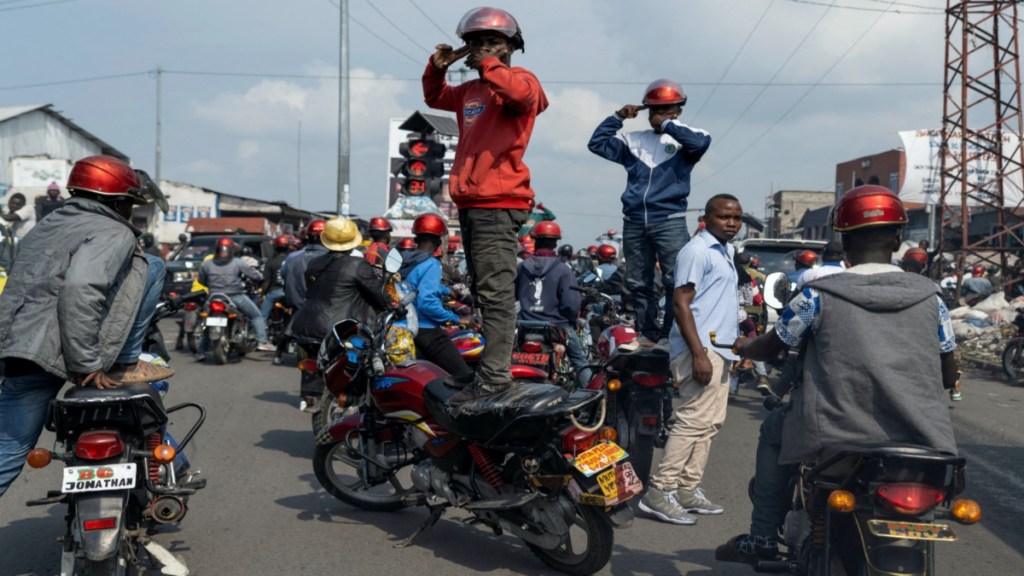BY MAHMOUD ADDANOU
War in Central Africa between the armed forces of the Democratic Republic of Congo (DRC) and the M23 rebel group, based in the country’s North Kivu region, has escalated since January this year. War in (DRC) is an old saga but maybe the new chapter is the regional Influence struggle is the most decisive factor in the current war rather than international interventions.
In December 2023, the Democratic Republic of Congo’s President Felix Tshisekedi won re-election but Instead of the desired political stability The country slid into war again where escalating violence is worsening the humanitarian situation.
Owing to its rich natural resources the (DRC) is suffering throughout modern history from foreign interventions used to drying up Its rich resources. The DRC is familiar with the external interventions and the fact that western countries (particularly the United States, Belgium, and France) are implicated in the exploitation of Congo’s resources, but the ongoing war has shown us a new version of interventions from neighbouring countries principally Rwanda and Uganda.
Many political analysts agreed that Congo’s neighbours continue to destabilize it. The United States strongly condemns Rwanda for backing M23 armed group the main fighting group in eastern DRC in press statement in 17 of February 2024 the United States condemns Rwanda’s support for the M23 armed group and calls on Rwanda to immediately withdraw all Rwanda Defence Force personnel from the DRC and remove its surface-to-air missile systems, which threaten the lives of civilians, UN and other regional peacekeepers, humanitarian actors, and commercial flights in eastern DRC.
Josep Borrell, the European Union’s top diplomat, says the 27-member bloc has condemned offensives by the Rwanda-based M23 group as well as those executed by “other armed groups in eastern DRC”. Borrell’s statement makes clear the European bloc is committed to support peace, stabilisation and sustainable development of eastern DRC and the region as a whole.The war in DRC on the way to total a regional war in the eastern DRC now South African, Burundian and Tanzanian troops are fighting against the Rwandan army, which has deployed in support of the M23.
Soldiers from South Africa and Burundi, as well as from the United Nations peacekeeping mission, have recently suffered casualties in the crossfire, civilians have fled: seven million Congolese are now displaced due to this and multiple other crises in the DRC. Rwanda, which has denied backing M23, says the Rwandan rebel group – Forces Démocratiques pour la Libération du Rwanda (FDLR) – which includes combatants who participated in the 1994 genocide, has been fully integrated into the Congolese army. It also claims that the Congolese government is engaged in “massive combat operations” aimed at expelling Congolese Tutsi civilians. The Congolese government has mounted a campaign against Rwanda. In December, while he campaigned for re-election, President Félix Tshisekedi compared his Rwandan counterpart to Adolf Hitler and accused him of expansionist aims.
In January, the Burundian president Évariste Ndayishimiye closed his border with Rwanda and accused the country of backing rebels against him. He stopped just short of calling for Kagame’s ouster. Francis Lomami, a human and civil rights advocate from the Democratic Republic of the Congo, lecturer in political science and international relations at the Université Libre de Kinshasa, and a former expert in international cooperation at the Congolese Foreign Affairs Department, explains to vogue.com that the current conflict stems back to the first Congo War in 1996, dubbed the first African World War.
After the Rwandan genocide, when one million members of the Hutu tribe fled into Congo after the Tutsis took power, Rwanda invaded Congo, arguing they needed to destroy Hutu militias. In 1998, they invaded again, and several countries with a mixture of vested interests—Uganda, Zimbabwe, Chad, Sudan, and Namibia among them—came to fight in Congo. This resulted in the deaths of at least 250,000 people. To fund these wars, Congolese leaders sold mine sites to foreigners.
Since then, rebel groups created by Rwanda have backed major insurgencies, occupied large parts of Congo, and exploited its mineral wealth. “Rwanda is benefiting from the instability in the Congo, because they can then do business around its minerals. The genocide keeps on going due to economic interests in the region,” says Lomami. “When you analyse what’s happening underneath the conflict, it is just the illegal exploitation of mines.”
Resource-rich Congo has a long history of exploitation. Belgium and France played huge roles in destabilizing the region: when it was colonized by Belgium from 1908, King Leopold II was “sole owner” of Congo and implemented a rule of terror for its rubber. He halved the population there and made today’s equivalent of more than a billion dollars.
After a rushed independence in 1960, Congo became a casualty of the Cold War, with the Soviet Union and West vying for cobalt. The West installed a dictator, and kleptocratic Congolese elites ruled the mines. During the Rwandan genocide, it was France that armed the genocidiares that fled through Congo’s borders. Today, China has been accused of neo-colonialism—taking advantage of corrupt governments for economic benefit—and creating conditions reminiscent of colonial times, with hazardous conditions and abused workers.
The author is a Sudanese journalist/political analyst based in Kathmandu.
Disclaimer: Views expressed are personal and do not reflect the official position or policy of Financial Express Online. Reproducing this content without permission is prohibited).

